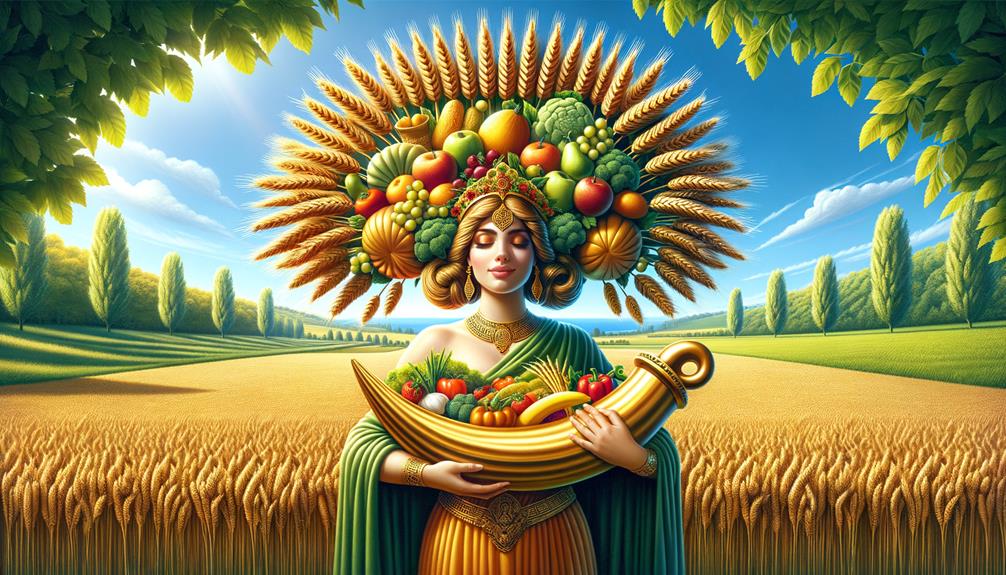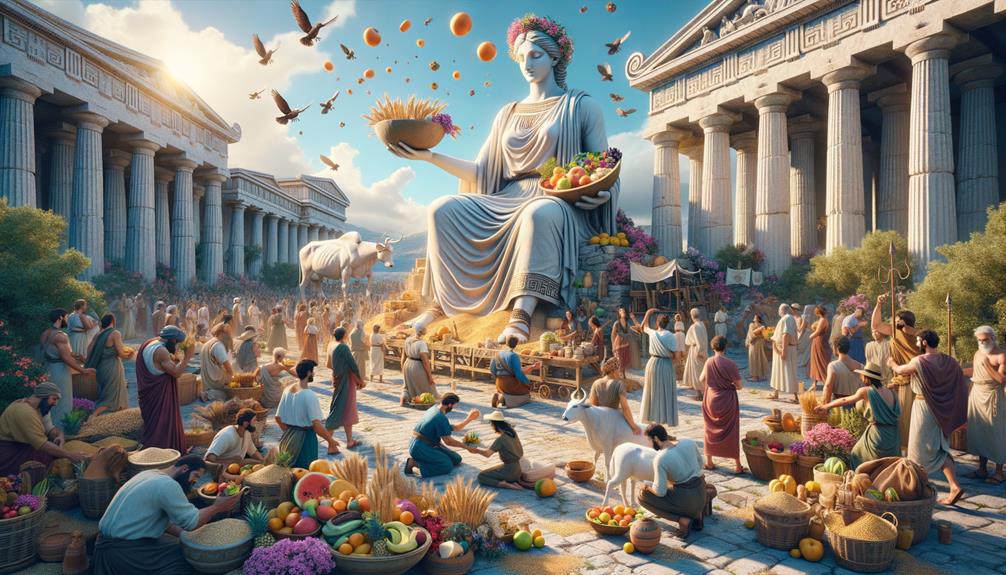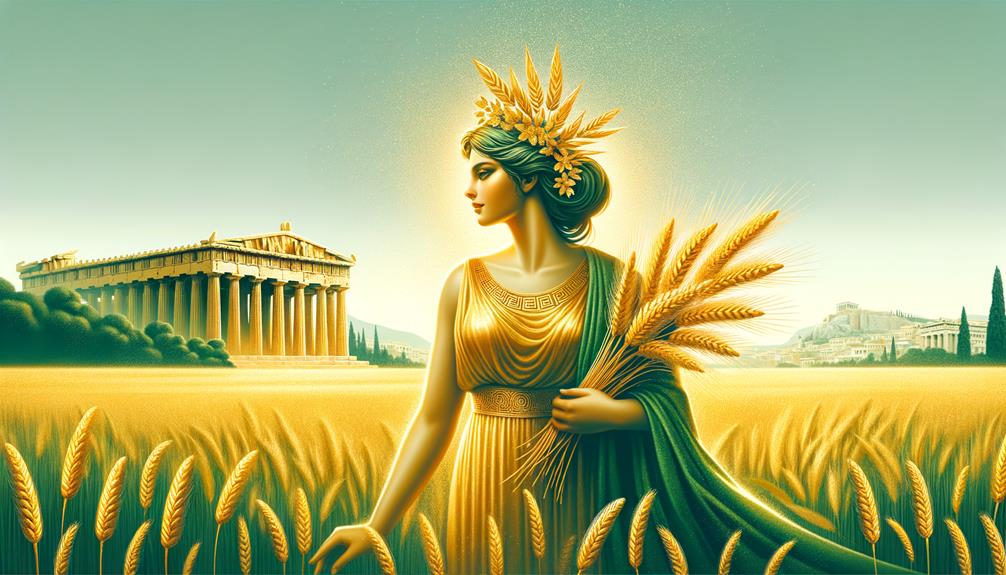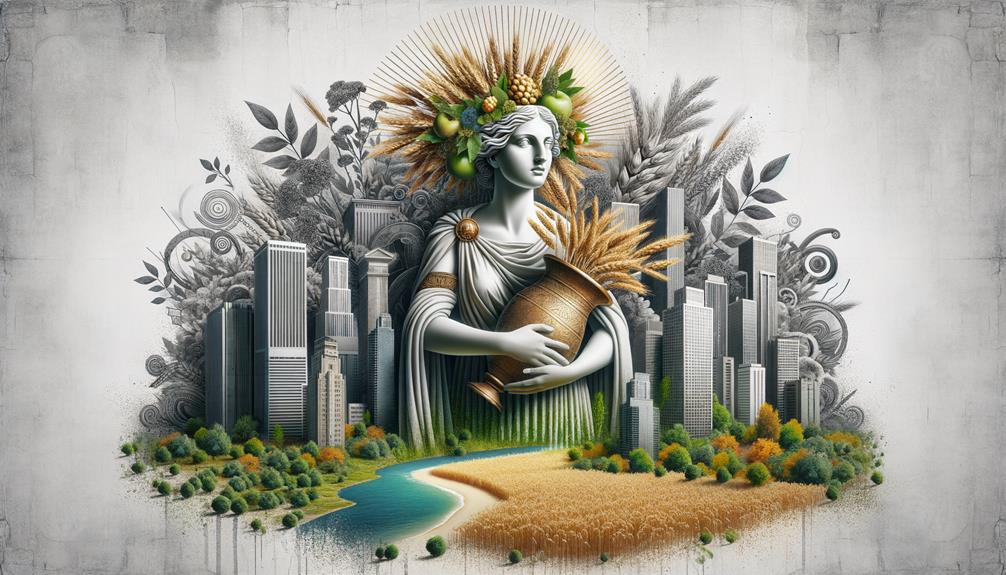Immerse Yourself in the Enigmatic World of Demeter, the Greek Harvest Goddess
Peel back the layers of Greek mythology, and you'll find yourself irresistibly drawn to the intriguing tale of Demeter, a powerful Greek harvest goddess. As the guardian of earth's fertility, Demeter's narrative weaves a captivating tapestry of life, mortality, rebirth, and notably, the undying bond of maternal love.
Demeter & Persephone: A Tale of Love and Resilience
The account of Demeter's relentless quest for her daughter, Persephone, stolen by Hades, the underworld god, has sparked curiosity throughout time and across borders. Despite extensive research and various interpretations, Demeter's myth continues to hold secrets, particularly about her worship, symbolism, and lasting impact on contemporary culture.
Unveiling the Multifaceted Demeter
Embarking on an exploration of this multidimensional goddess and her story offers an enriching and enlightening expedition. This is an adventure that will undoubtedly captivate your interest as the narrative unfolds.
Demeter's Influence in Modern Culture
Plumbing the depths of Demeter's worship and symbolism, we find that her influence stretches even into today's society. For instance, the concept of mother earth, widely used in environmental discourses, originates from Demeter's role as the earth's fertility goddess.
Recommendation
To dive deeper into the fascinating world of Demeter, consider reading "Demeter and Persephone: Lessons from a Myth" by Katharine T. von Stackelberg. This book offers a profound and comprehensive analysis of Demeter's myth in a reader-friendly manner.
In conclusion, the mythical tale of Demeter, with its intriguing layers and enduring influence, promises a journey as enriching as the fertile earth she governs. By exploring her narrative, we can glean valuable insights and appreciate the depth of Greek mythology.
The Etymology of Demeter

Understanding the Origins of Demeter's Name
The name 'Demeter' holds a plethora of interpretations, stirring interest among scholars and mythology enthusiasts alike. Broad consensus exists on the second part of her name, 'meter,' which originates from Proto-Indo-European and signifies 'mother.' This aligns seamlessly with Demeter's representation as an earth goddess in Greek mythology, epitomizing the maternal figure of harvest and agriculture. As such, she is often celebrated for her generous bounty that nurtures the earth.
In addition, Demeter stands tall as the emblematic grain goddess, symbolizing the ripe grain of the harvest that sustains us.
Delving into the 'Da' Mystery
The first part of Demeter's name, 'Da,' ignites scholarly debates. Some argue it could be the Doric equivalent of 'earth', further emphasizing her position as an earth goddess. Others posit it as a vernacular pronunciation of a foreign name. This uncertainty lends an alluring depth to Demeter's etymology and her function within Greek mythology.
Demeter: From Harvest to Hearth
Interestingly, Demeter's name might have surfaced in Linear A as 'da-ma-te,' a term associated with households in a Linear B inscription. This implies that she was not only worshipped as the goddess of the harvest but also revered as the guardian of the hearth. Consequently, the etymology of Demeter's name mirrors her multifaceted role in Greek society.
To sum it up, Demeter's name and etymology provide a captivating glimpse into her diverse roles within Greek culture. Her name is as complex as the myriad roles she played, from being a motherly earth goddess who nourished the land, to a protector of households, symbolizing the very essence of Greek mythology. The mystery of her name not only intrigues but also engages us in a deeper exploration of her character and the culture that revered her.
Iconic Depictions of Demeter

The Grandeur of Demeter in Greek Mythology
Demeter in Greek mythology captivates us with her multifarious roles, etched in various compelling forms. Revered as the *Great Mother* and the *Mother of the Gods*, she held an instrumental role in Greek religion. This goddess of the earth was the embodiment of Earthly abundance, highlighted through her association with harvest, flowers, fruit and grain imagery. Her dominion over agriculture is a testament to the deep respect she commanded among the ancients.
Let's delve into the captivating symbolism of Demeter's iconic depictions:
1. Demeter with a Sheaf of Wheat: Representing Harvest and Agriculture
The image of Demeter clutching a sheaf of wheat encapsulates her control over agriculture and the harvest. It's a vivid portrayal of her role in ensuring Earth's fertility, and the sustenance of life itself.
2. Black Demeter with a Horse Head: Symbolizing Strength and Fertility
The depiction of Black Demeter with a horse head conveys a message of strength and fertility. It's a powerful symbol that underscores her might as the guardian of Earth's fertility.
3. Demeter and Persephone: Signifying the Cycle of Life and Death
The poignant tale of Demeter and Persephone elucidates the cyclical nature of life and death. This story serves as a potent reminder of the transient nature of existence.
This exploration of Demeter's depictions highlights her significance in Greek mythology. It's intriguing how these depictions extend beyond Greek mythology, as Demeter is often likened to Ceres, her Roman equivalent. This parallel further emphasizes her universal appeal as the embodiment of Mother Earth.
By delving into these depictions, we not only understand the profound symbolic significance of Demeter's character but also appreciate her role as a powerful female figure in mythology. These portrayals and their underlying symbolism serve as a testament to her enduring relevance, helping us to better comprehend the intricacies of Greek mythology. This exploration also underscores the importance of understanding the symbolism behind iconic depictions to appreciate the depth of cultural narratives fully.
Let's continue to explore and appreciate the richness of these ancient narratives, finding new ways to understand and relate to these timeless tales. Reflecting on these stories allows us to better understand our own world and the universal themes that continue to shape our experiences.
Worship and Festivals of Demeter

Worshipping Demeter: A Journey into Ancient Greek Rituals and Festivals
Let's delve into the intriguing world of Demeter's worship and the grandiose festivals celebrated in her name. Hailed as the Great Goddess, Demeter's significance in ancient Greek religion is undeniable, embodying fertility and the generous gifts of earth. Her cult was embraced in Crete and various other regions, leaving a profound impact on local customs and beliefs.
The worship of Demeter is a riveting tapestry woven with four main threads:
1. Vibrant Festivals: The Thesmophoria and Eleusinia stand out as the primary celebrations honoring Demeter and her daughter, Persephone. Think of these as the ancient Greek equivalent of Thanksgiving, joyously recognizing the earth's bounty.
2. Sacred Sacrifices: Devotees offered a variety of items to the Olympian goddess, including pigs, bulls, cows, honey-cakes, and fruits. This can be likened to modern-day offerings in temples, seeking divine blessings.
3. Temples of Nature: Known as Megara, the temples of Demeter were typically nestled in groves near towns, symbolizing her intimate bond with nature. It's comparable to our contemporary eco-friendly practices that acknowledge nature's role in our lives.
4. Mysterious Rites: The Eleusinian Mysteries were celebrated as significant religious rites. These marked Persephone's return while glorifying Demeter as Persephone's mother. Similar modern-day rituals exist, emphasizing rebirth and renewal.
By embodying these practices, the ancient Greeks recognized Demeter's role in their survival, ensuring the earth's fertility and their own sustenance.
To sum it up, worshipping Demeter was an integral part of ancient Greek culture, influencing their lifestyle, beliefs, and traditions. The vivacious festivals, sacred sacrifices, nature-oriented temples, and mysterious rites all emphasized their reverence for the Great Goddess. It's an intriguing reminder of how ancient cultures acknowledged and respected the earth's bounty, a lesson we can still learn from today.
Demeter's Role in Greek Mythology

Discovering Demeter: The Heart of Greek Mythology
In the intricate world of Greek mythology, Demeter shines as the embodiment of Earth's nurturing spirit. She stands as the goddess of grain and agriculture, her influence permeating the core of ancient Greek civilization. Her significance as the Greek harvest goddess is instrumental in grasping the agricultural focus of these historical societies.
Demeter's Multifaceted Role in Greek Mythology
Demeter's role in Greek mythology is as diverse as nature itself. She is revered as 'mother earth', her patronage extending to those whose lives revolve around Earth's bounty. Beyond the realm of agriculture, Demeter's influence reaches into law and life-death cycles. This reflects the ancient Greeks' comprehension of nature's rhythms and their profound effects on societal constructs.
A prime example of her influence is seen when her daughter, Persephone, was snatched away by Hades, the brother of the king of gods. As a result, a grief-stricken Demeter neglected her duties, leading to a severe famine.
Demeter's interactions with other gods and goddesses further adds depth to her character. She bore her daughter with Zeus, and her tumultuous relationship with Poseidon further weaves her story into the rich Greek pantheon.
Demeter: A Symbol of Earth's Fertility
As a Greek goddess, Demeter represents Earth's fertility and mankind's dependency on it. Her narrative is filled with themes of loss and renewal, reflecting the cyclical nature of agriculture. This, in turn, enhances her significance within Greek mythology.
The story of Demeter serves as an excellent introduction to Greek mythology for newcomers. For those who want a deeper understanding of Greek mythology, we recommend books like "The Library of Greek Mythology" by Apollodorus and "D'Aulaires' Book of Greek Myths".
In the realm of Greek mythology, the name 'Demeter' is synonymous with the Earth's fertility and mankind's reliance on it. Her story continues to resonate with modern audiences, offering valuable insights into the agricultural foundation of ancient Greek civilization. This is a testament to the timeless allure of Greek mythology and the ever-relevant lessons it imparts.
Demeter's Influence in Modern Culture

In the Interplay of Modern Culture and Demeter's Influence
Demeter's vivid narrative as an ancient Greek harvest deity doesn't just gather dust in history books – it actively shapes our modern world in numerous, fascinating ways.
- Artistic Metaphors from Greek Mythology: Take, for instance, the heart-rending tale of Hades abducting Persephone, Demeter's daughter. This story, filled with Demeter's palpable sorrow, finds a parallel in modern arts and literature as a poignant metaphor for life's cyclical journey through birth, death, and resurrection.
- Sustainable Farming and Ecological Movements: As a venerated Greek harvest goddess, Demeter embodies principles of nurturing and abundance. Her ethos echoes powerfully in our current embrace of sustainable farming practices and ecological movements, signaling a renewed respect for Earth's fertility. Consider, for instance, the growth of organic farming – a real-world manifestation of Demeter's influence.
- Spiritual Traditions and Enlightenment: The Eleusinian Mysteries, rituals dedicated to Demeter and Persephone, have left an indelible mark on various spiritual traditions. Their legacy fosters a quest for enlightenment through divine wisdom, enriching our spiritual landscapes.
- Feminist Discourse and Feminine Strength: Within modern feminist dialogue, the figure of Demeter as a mother goddess symbolizes feminine power, nurturing abilities, and the intricate web of life. Her role serves as a potent reminder of the strength inherent in femininity.
In essence, Demeter's influence remains far from obsolete. The gods of Olympus might be consigned to mythology, yet Demeter's profound message resonates vibrantly in our 21st-century world. "The gods of Olympus may have been relegated to myth, but the profound impact of Demeter's narrative continues to reverberate in our 21st-century world."
Frequently Asked Questions
Was Demeter the Greek Goddess of the Harvest?
Demeter: Greek Goddess of Abundance
Absolutely, without a doubt, Demeter is recognized as the Greek goddess of the harvest. As the deity responsible for the fertility of the earth, she plays a pivotal role in ancient Greek mythology. More than just overseeing the harvest, she symbolizes the cyclical nature of life, embodying both birth and death.
Let's delve a bit deeper into her mythological significance.
The Multifaceted Goddess: Beyond Harvest
Demeter's association extends far beyond just the harvest. Her influence blankets the realms of fertility, life, and death, thus situating her at the very heart of the existential cycle. To understand Demeter is to understand the essence of life itself.
You may ask, why is Demeter so significant in Greek mythology?
Imagine the annual cycle of crops, from sowing to reaping. This cycle mirrors the human experience of life, growth, decline, and eventual death. It is this universal truth that Demeter embodies.
Real-World Resonance: Demeter's Lasting Impact
Demeter's influence isn't confined to the ancient world. Today, she resonates in the agricultural practices followed across the globe, a testament to the timeless relevance of her mythological character.
If you're interested in delving deeper into Greek mythology, I recommend "D'Aulaires' Book of Greek Myths". This comprehensive guide provides engaging and clear insights into the complex world of Greek mythology, including the multifaceted character of Demeter.
Harnessing the power of clarity, engagement, and precision, we've unraveled the rich tapestry of mythology surrounding Demeter, the Greek goddess of the harvest. Remember, understanding mythology allows us to better comprehend the human condition, making it a fascinating field to explore.
Which Goddess Is Associated With the Harvest?
Demeter: The Greek Goddess of Harvest
Have you ever wondered who the Greeks turned to for bountiful harvests? Here's a hint: it's not explicitly mentioned in your query, but the goddess in question is typically linked to earth's fertility and the grain domain. Demeter is her name, a deity who plays a pivotal role in Greek mythology.
As you delve deeper into her story, you'll find that Demeter doesn't just represent the harvest. She's also the embodiment of nature's cycles, bringing forth life from the earth in the form of crops. She's a symbol of both nurturing and growth, a beacon of prosperity for the ancients who relied on her for their survival.
But why is she so significant? Precisely, because she provides a real-world example of the deep-rooted respect ancient cultures had for nature's gifts. They recognized the pivotal role agriculture played in their lives and venerated Demeter as a result. Today, we can still draw inspiration from this, valuing our environment and the food it provides us.
So next time you think about the bountiful harvests, remember Demeter. She's not just a figure from ancient Greek mythology but a symbol of earth's generous fertility. Remember to appreciate the food on your table and the rich soils that make it possible.
In this modern age, we might not have goddesses to pray to, but we can certainly follow the Greeks' example in treasuring what the earth provides.
Is Demeter the Goddess of Seasons?
Demeter: A Deeper Insight
Absolutely not! Demeter is not identified as the Goddess of Seasons. This misconception arises from her profound connection with the agricultural and plant life cycles. Understandably, this association brings the seasons into play, but it's essential to fully grasp her true identity.
Demeter's Impact on Natural Cycles
Intriguingly, my emotional state deeply influences the earth's fecundity. This influence serves as a powerful symbol of nature's cyclical transformations. Here's an interesting real-world example: think of a farmer watching the changing seasons, anticipating the right time to plant and harvest crops. This cycle is largely influenced by Demeter's emotions – a captivating illustration of her influence.
Understanding Demeter's Role
Let's dive a bit deeper. Demeter, in essence, is more than a divine figure in agriculture. She's a poignant symbol of how emotions can dictate the rhythm of life itself, influencing the fertility of the earth – a concept that resonates deeply with the agricultural community.
Demeter: Beyond the Seasons
So, is Demeter the Goddess of Seasons? The answer remains a resounding 'no.' Her influence extends beyond mere seasonal changes. It's about the life-giving force of agriculture and the cyclical changes in nature. That's what makes Demeter a powerful and influential figure in mythology and beyond.
Engage with Demeter's World
Want to understand more about Demeter's impact on agriculture and plant life cycles? Dive into some of the many books available that delve into her influence. A recommended starting point is "Demeter: The Goddess of Agriculture and Fertility" – a comprehensive guide to understanding her role in the cyclical changes of nature.
Who Is the Goddess of Harvest Fertility?
Who Reigns as the Goddess of Harvest and Fertility?
Are you seeking clarity on the goddesses of fertility and harvest? Allow me to illuminate: in the realm of Roman mythology, the crown rests on the head of the goddess Ceres. Yet, if your curiosity veers towards Greek mythology, then it's Demeter who holds the scepter as the deity of harvest and fertility.
To unpack these mythological narratives further, let's delve into some 'Semantic Triples.' These are elements that consist of a subject, a predicate, and an object. For instance, ‘Ceres is the Roman goddess of harvest and fertility'. Here, 'Ceres' is the subject, 'is' the predicate, and ‘the Roman goddess of harvest and fertility' the object. This helps us establish the identities of these goddesses with precision.
Now, to give you some real-world examples, think of Ceres as the 'Mother Earth' of Roman mythology, nourishing humanity with fruitful abundance. Similarly, envision Demeter, the Greek equivalent, who is often depicted with a sheaf of wheat, showcasing her dominion over the life-giving cycle of plants.
Demeter and Ceres – Vital Deities of Ancient Cultures
These goddesses were not just symbols; they were essential figures of worship in their respective cultures. Their realms, encompassing fertility, agriculture, and motherhood, were integral to the survival and prosperity of ancient societies.
In conclusion, whether you immerse yourself in Roman or Greek mythology, both Ceres and Demeter stand as formidable figures of harvest and fertility. They serve as enduring symbols of life's cycles and the bountiful gifts of the Earth.

